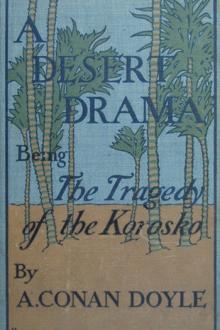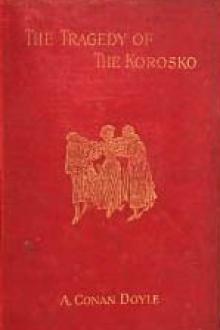A Desert Drama, Arthur Conan Doyle [best ebook reader for pc .txt] 📗

- Author: Arthur Conan Doyle
- Performer: -
Book online «A Desert Drama, Arthur Conan Doyle [best ebook reader for pc .txt] 📗». Author Arthur Conan Doyle
Miss Adams, who had been frozen into silence during the long cold night, began to thaw now in the cheery warmth of the rising sun. She looked about her, and rubbed her thin hands together.
“Why, Sadie,” she remarked, “I thought I heard you in the night, dear, and now I see that you have been crying.”
“I have been thinking, Auntie.” “Well, we must try and think of others, dearie, and not of ourselves.” “It's not of myself, Auntie.” “Never fret about me, Sadie.” “No, Auntie, I was not thinking of you.” “Was it of any one in particular.” “Of Mr. Stephens, Auntie. How gentle he was, and how brave! To think of him fixing up every little thing for us, and trying to pull his jacket over his poor roped-up hands, with those murderers waiting all round his. He's my saint and hero from now ever after.”
“Well, he's out of his troubles anyhow,” said Miss Adams, with that bluntness which the years bring with them.
“Then I wish I was also.”
“I don't see how that would help him.”
“Well, I think he might feel less lonesome,” said Sadie, and drooped her saucy little chin upon her breast.
The four had been riding in silence for some little time, when the Colonel clapped his hand to his brow with a gesture of dismay.
“Good God!” he cried, “I am going off my head.”
Again and again they had perceived it during the night, but he had seemed quite rational since daybreak. They were shocked, therefore, at this sudden outbreak, and tried to calm him with soothing words.
“Mad as a hatter,” he shouted. “Whatever do you think I saw?”
“Don't trouble about it, whatever it was,” said Mrs. Belmont, laying her hand soothingly upon his as the camels closed together. “It is no wonder that you are overdone. You have thought and worked for all of us so long. We shall halt presently, and a few hours' sleep will quite restore you.”
But the Colonel looked up again, and again he cried out in his agitation and surprise.
“I never saw anything plainer in my life,” he groaned. “It is on the point of rock on our right front,—poor old Stuart with my red cummerbund round his head just the same as we left him.”
The ladies had followed the direction of the Colonel's frightened gaze, and in an instant they were all as amazed as he.
There was a black, bulging ridge like a bastion upon the right side of the terrible khor up which the camels were winding. At one point it rose into a small pinnacle. On this pinnacle stood a solitary, motionless figure clad entirely in black, save for a brilliant dash of scarlet upon his head. There could not surely be two such short, sturdy figures or such large, colourless faces in the Libyan desert. His shoulders were stooping forward, and he seemed to be staring intently down into the ravine. His pose and outline were like a caricature of the great Napoleon.
“Can it possibly be he?”
“It must be. It is!” cried the ladies. “You see he is looking towards us and waving his hand.”
“Good Heavens! They'll shoot him! Get down, you fool, or you'll be shot!” roared the Colonel. But his dry throat would only emit a discordant croaking.
Several of the Dervishes had seen the singular apparition upon the hill, and had un-slung their Remingtons, but a long arm suddenly shot up behind the figure of the Birmingham clergyman, a brown hand seized upon his skirts, and he disappeared with a snap. Higher up the pass, just below the spot where Mr. Stuart had been standing, appeared the tall figure of the Emir Abderrahman. He had sprung upon a boulder, and was shouting and waving his arms, but the shouts were drowned in a long, rippling roar of musketry from each side of the khor. The bastion-like cliff was fringed with gun-barrels, with red tarbooshes drooping over the triggers. From the other lip also came the long spurts of flame and the angry clatter of the rifles. The raiders were caught in an ambuscade. The Emir fell, but was up again and waving. There was a splotch of blood upon his long white beard. He kept pointing and gesticulating, but his scattered followers could not understand what he wanted. Some of them came tearing down the pass, and some from behind were pushing to the front. A few dismounted and tried to climb up sword in hand to that deadly line of muzzles, but one by one they were hit, and came rolling from rock to rock to the bottom of the ravine. The shooting was not very good. One negro made his way unharmed up the whole side, only to have his brains dashed out with the butt-end of a Martini at the top. The Emir had fallen off his rock and lay in a crumpled heap, like a brown and white patch-work quilt at the bottom of it. And then when half of them were down it became evident, even to those exalted fanatical souls, that there was no chance for them, and that they must get out of these fatal rocks and into the desert again. They galloped down the pass, and it is a frightful thing to see a camel galloping over broken ground. The beast's own terror, his ungainly bounds, the sprawl of his four legs all in the air together, his hideous cries, and the yells of his rider who is bucked high from his saddle with every spring, make a picture which is not to be forgotten. The women screamed as this mad torrent of frenzied creatures came pouring past them, but the Colonel edged his camel and theirs farther and farther in among the rocks and away from the retreating Arabs. The air was full of whistling bullets, and they could hear them smacking loudly against the stones all round them.
“Keep quiet, and they'll pass us,” whispered the Colonel, who was all himself again now that the hour for action had arrived. “I wish to Heaven I could see Tippy Tilly or any of his friends. Now is the time for them to help us.” He watched the mad stream of fugitives as they flew past upon their shambling, squattering, loose-jointed beasts, but the black face of the Egyptian gunner was not among them.
And now it really did seem as if the whole body of them, in their haste to get clear of the ravine, had not a thought to spend upon the prisoners. The rush was past, and only stragglers were running the gauntlet of the fierce fire which poured upon them from above. The last of all, a young Baggara with a black moustache and pointed beard, looked up as he passed and shook his sword in impotent passion at the Egyptian riflemen. At the same instant a bullet struck his camel, and the creature collapsed, all neck and legs, upon the ground. The young Arab sprang off its back, and, seizing its nose-ring, he beat it savagely with the flat of his sword to make it stand up. But the dim, glazing eye told its own tale, and in desert warfare the death of the beast is the death of the rider. The Baggara glared round like a lion at bay, his dark eyes flashing murderously from under his red turban. A crimson spot, and then another, sprang out upon his dark skin, but he never winced at the bullet wounds. His fierce gaze had fallen upon the prisoners, and with an exultant shout he was dashing towards them, his broad-bladed sword gleaming above his head. Miss Adams was the nearest to him, but at the sight of the rushing figure and the maniac face she threw herself off the camel upon the far side. The Arab bounded on to a rock and aimed a thrust at Mrs. Belmont, but before the point could reach her the Colonel leaned forward with his pistol and blew the man's head in. Yet with a concentrated rage, which was superior even to the agony of death, the fellow lay kicking and striking, bounding about among the loose stones like a fish upon the shingle.
“Don't be frightened, ladies,” cried the Colonel. “He is quite dead, I assure you. I am so sorry to have done this in your presence, but the fellow was dangerous. I had a little score of my own to settle with him, for he was the man who tried to break my ribs with his Remington. I hope you are not hurt, Miss Adams! One instant, and I will come down to you.”
But the old Boston lady was by no means hurt, for the rocks had been so high that she had a very short distance to fall from her saddle. Sadie, Mrs. Belmont, and Colonel Cochrane had all descended by slipping on to the boulders and climbing down from them. But they found Miss Adams on her feet, and waving the remains of her green veil in triumph.
“Hurrah, Sadie! Hurrah, my own darling Sadie!” she was shrieking. “We are saved, my girl, we are saved after all.”
“By George, so we are!” cried the Colonel, and they all shouted in an ecstasy together.
But Sadie had learned to think more about others during those terrible days of schooling. Her arms were round Mrs. Belmont, and her cheek against hers.
“You dear, sweet angel,” she cried, “how can we have the heart to be glad when you—when you——”
“But I don't believe it is so,” cried the brave Irishwoman. “No, I'll never believe it until I see John's body lying before me. And when I see that, I don't want to live to see anything more.”
The last Dervish had clattered down the khor, and now above them on either cliff they could see the Egyptians—tall, thin, square-shouldered figures, looking, when outlined against the blue sky, wonderfully like the warriors in the ancient bas-reliefs. Their camels were in the background, and they were hurrying to join them. At the same time others began to ride down from the farther end of the ravine, their dark faces flushed and their eyes shining with the excitement of victory and pursuit. A very small Englishman, with a straw-coloured moustache and a weary manner, was riding at the head of them. He halted his camel beside the fugitives and saluted the ladies. He wore brown boots and brown belts with steel buckles, which looked trim and workmanlike against his kharki uniform.
“Had 'em that time—had 'em proper!” said he. “Very glad to have been of any assistance, I'm Shaw. Hope you're none the worse for it all. What I mean, it's rather rough work for ladies.”
“You're from Haifa, I suppose?” asked the Colonel.
“No, we're from the other show. We're the Sarras crowd, you know. We met in the desert, and we headed 'em off, and the other Johnnies headed them behind. We've





Comments (0)